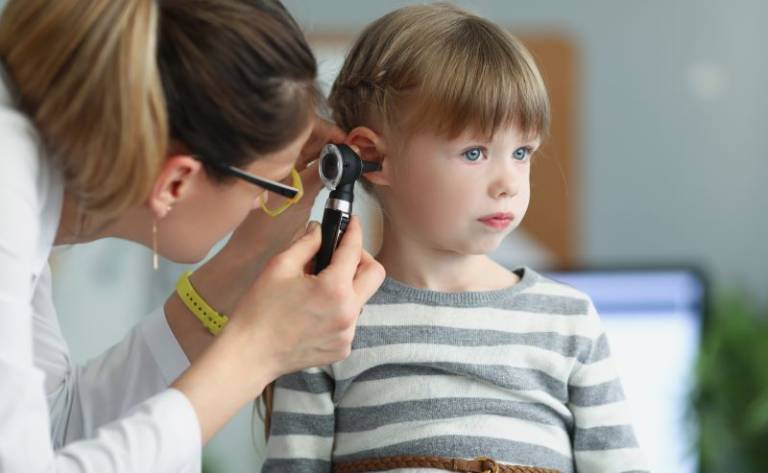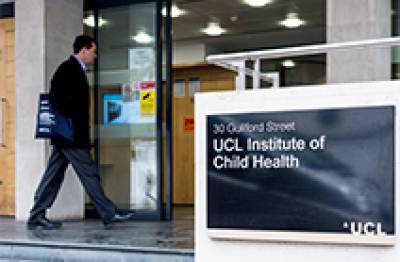New gene therapy could reduce hearing loss in Norrie disease
6 September 2023
A gene therapy developed in mice by an international team of researchers led by UCL and the NIHR Great Ormond Street Hospital Biomedical Research Centre, could significantly reduce hearing loss associated with Norrie disease.

Norrie disease is a rare but devastating genetic disorder that causes blindness and hearing loss. The condition primarily affects boys.
Children affected by the condition are born blind and develop progressive hearing loss from around the age of 12 years old. The research, published in EMBO, aimed to investigate whether it was possible to slow or prevent this from happening.
Currently, the only possible treatment option to help hearing loss in Norrie disease, is cochlear implants. However, these are only partly effective.
The new research has found that gene therapy can be used to prevent the death of vitally important hair cells in the cochlea (the part of the inner ear responsible for sensing sound) and stop the loss of hearing associated with Norrie disease.
Professor Jane Sowden (UCL Great Ormond Street Institute of Child Health and co-theme lead of tissue engineering and regenerative medicine at the NIHR GOSH BRC), who led the research, said: “I hope that gene therapy for hearing loss caused by faulty genes will soon be available for patients.
“In this study we were able to reduce the progressive hearing loss in a Norrie disease model by gene therapy for the first time. The treatment in mice was successful not only for newborns but also when we treated at a stage comparable to children and young people.
“This is exciting progress as it lays the groundwork for future application in patients – this could be transformative for them and their families and carers.”
To achieve this, the team injected a gene therapy designed to restore the missing norrin protein. They showed that the abnormal blood vessels in the ears and eyes that develop in mice with Norrie disease are improved by the treatment.
Researchers hope that this could help prevent deafblindness as tests showed both better hearing and vision after gene therapy treatment in mice.
Co-author, Dr James Wawrzynski (UCL Great Ormond Street Institute of Child Health), said: “Children with Norrie disease progressively lose their hearing because of a faulty gene called NDP, which is responsible for some of the structures in the inner ear.
“In our study we have shown that in mice with Norrie disease, we can correct this faulty gene by inserting billions of new ‘fixed’ copies into the bloodstream. This gene therapy appears to lead to better blood vessel structure in the inner ear and crucially we can see the sensory hairs are protected.
“Being able to offer effective treatment could be life-changing for children who are seen at hospitals around the world, including at GOSH. Being blind can be challenging but treating or slowing the progression of hearing loss could mean the difference between independence as an adult, or not.”
First author, Dr Valda Pauzuolyte (UCL Great Ormond Street Institute of Child Health), said: “We have previously shown that Norrie hearing loss of the sensory hair cells in the inner ear. While there may also be other factors involved, once lost, cochlear hair cells cannot regrow. This new work shows that NDP gene therapy can be very effective in preventing further damage to the hair cells and hearing in Norrie disease in mice.
“Hearing is one of the most important senses. While sight loss is already established at birth for those with Norrie disease, this work shows how we might be able to help them keep their hearing – an incredibly important sense.”
When this research was initially funded, patient advocacy group the Norrie Disease Foundation, who provide vital support to families living with the condition, commented: "Our hope is that this research will provide a treatment so our blind community don’t also become deaf.
“Currently, families are expected to deal and cope with the symptoms. Now there is a chance that one of the life-changing symptoms can be delayed or even stopped. There is potential for a brighter future for Norrie patients, and this gives a feeling of optimism. Whilst Norrie disease can’t currently be cured, it feels like we are one step closer to making the condition less devastating."
This research was funded by GOSH Charity, the NIHR GOSH BRC, which underpins all research at GOSH, Newlife the Charity for Disabled Children, SPARKS, and the Royal National Institute for Deaf People.
Links
- Research in EMBO
- Professor Jane Sowden’s academic profile
- Dr James Wawrzynski’s academic profile
- UCL Great Ormond Street Institute of Child Health
- UCL Population Health Sciences
- NIHR Great Ormond Street Hospital Biomedical Research Centre
Image
- Credit: Ivan-balvan on iStock
Media contact
Poppy Danby
E: p.danby [at] ucl.ac.uk
 Close
Close


